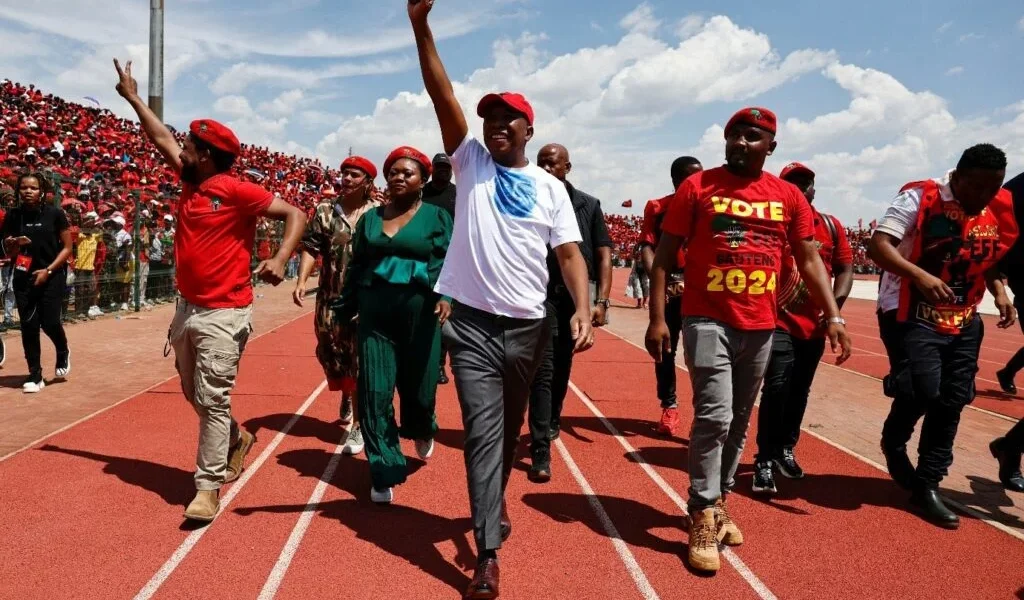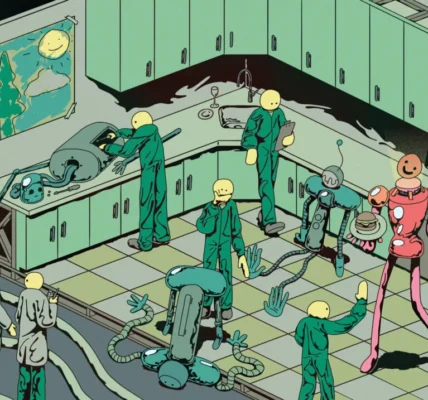
SOUTH Africa’s Julius Malema, who quit the ruling African National Congress (ANC) to form the radical leftist party, the Economic Freedom Fighters (EFF), could potentially become a kingmaker or even deputy president if the ANC loses its majority in Wednesday’s election, as polls suggest.
The possibility of the ANC co-opting Malema and his EFF to maintain power has alarmed investors and the white upper-middle class, whom he frequently criticises. The EFF’s radical proposals, including nationalising the country’s gold and platinum mines and seizing land from white farmers, are seen as significant threats to Africa’s most industrialised economy.
‘Fellow South Africans, our country stands at a crossroads,’ Malema declared at a recent rally. ‘The EFF is here to address the racial and economic injustices that persist.’
Malema’s message of addressing racial and economic disparities resonates deeply with his constituents, including tens of thousands of unemployed, disenfranchised urban Black youths, and middle-class students struggling with fees or unemployment in a stagnant economy.
‘The EFF points out accurately … that we haven’t solved the racial issue in this country,’ Steven Friedman, director of South Africa’s Centre for the Study of Democracy, told Reuters. However, he noted that Malema had struggled to broaden the party’s appeal to those in extreme poverty in rural areas.
The ANC, which liberated Black South Africans from white minority rule, has yet to deliver widespread prosperity, with the wealth gap widening over the past three decades. A third of South Africans, including many Black voters with college degrees, remain out of work.
In the 2019 national polls and 2021 local elections, the EFF, reminiscent of past socialist movements with its red shirts and berets, captured more than 10 percent of the vote. Despite this, Malema’s personal wealth and lifestyle have drawn criticism from political rivals who mock his taste for luxury cars, gold watches, champagne, and mansions. He sold one such mansion, complete with a cinema and cigar lounge, to pay off $1 million in tax arrears. Malema has faced corruption allegations, which he denies, and a court dismissed money laundering charges against him in 2015.
At a 2020 rally in Senekal, Free State province, Malema demonstrated his ability to escalate and then defuse racial tensions. His Black supporters, wearing red shirts, faced off against a small group of white supremacists in apartheid-era army uniforms. An EFF security guard’s friendly gesture to one of the white protestors helped calm the situation.
Born to a domestic worker in Limpopo, north of Johannesburg, Malema was politically active from a young age and rose to ANC Youth League president in 2008. He founded the EFF after being suspended by the ANC in 2011 for ‘sowing division.’
Despite his polarising nature, Malema’s followers affectionately call him ‘Juju.’ His critics, however, label him a ‘firebrand,’ ‘militant,’ ‘clown,’ or ‘populist.’ In a nation where hostility towards migrants from other African countries is a key populist issue, the EFF is the only party advocating for the free movement of Africans.
‘The EFF is swimming against the tide when it comes to immigration,’ said Chris Ogunmodede, analyst and editor of World Politics Review. ‘[It] will likely lose out [on] many votes it might otherwise get.’
Although Malema briefly flirted with xenophobia in January 2022 by inspecting restaurants to check their employment of foreigners, he has not repeated the stunt.
As South Africa approaches a crucial election, the potential rise of Julius Malema and the EFF represents both a challenge and an opportunity for the nation. The coming days will reveal whether the ANC can retain its majority or if Malema will indeed become a pivotal figure in South Africa’s political landscape.













